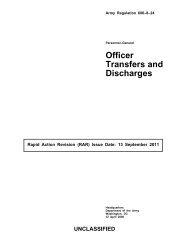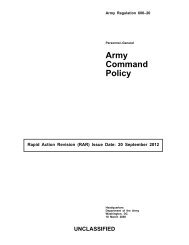Patient Administration - Army Publishing Directorate - U.S. Army
Patient Administration - Army Publishing Directorate - U.S. Army
Patient Administration - Army Publishing Directorate - U.S. Army
You also want an ePaper? Increase the reach of your titles
YUMPU automatically turns print PDFs into web optimized ePapers that Google loves.
authorities, to the sponsor or NOK. When a nonmilitary patient with a psychiatric condition requires further hospitalization,<br />
the MTF commander will contact the sponsor or NOK to ascertain whether the relative wishes to assume the<br />
custody and responsibility for the patient’s care. The relative will be advised of all factors which render acceptance of<br />
the patient inadvisable and of the responsibility in the care of such patient. The relative who accepts responsibility for<br />
the patient will present an affidavit declaring his/her willingness to assume responsibility for the patient.<br />
(1) When transfer to the NOK is inappropriate, the MTF commander will contact proper authorities of the State of<br />
legal or current residence to obtain authorization to transfer the patient to State custody.<br />
(2) To aid the State authorities in reaching a timely decision they should be provided—<br />
(a) The patient’s diagnosis.<br />
(b) The date of onset of the condition.<br />
(c) History of previous hospitalization for mental illness.<br />
(d) Residence.<br />
(e) Place and date of birth.<br />
(f) Name and address of the NOK.<br />
(3) Commitment proceedings or laws for involuntary hospitalization vary among the States. <strong>Army</strong> MTF personnel<br />
must be thoroughly familiar with local requirements for emergency involuntary admission to or retention in local<br />
civilian facilities designated for the care of psychiatric patients.<br />
5–24. Evacuation of military spouses from overseas areas to the United States<br />
When a hospitalized military spouse is evacuated from an overseas area to an MTF in the United States and is<br />
accompanied by a child or children but not by the military sponsor, plans will be made for the care of the children<br />
while the parent is hospitalized. The overseas MTF commander will ensure that plans for the child or children are<br />
coordinated with the social worker at the receiving MTF before the Family departs from the overseas area.<br />
Chapter 6<br />
<strong>Patient</strong>s in Special Circumstances<br />
6–1. General<br />
This chapter prescribes procedures for preparing and maintaining records pertaining to VSI and SI patients, deceased<br />
persons, and patients in certain special categories (SPECAT). It also contains authority for the MTF commander to<br />
order autopsies. Notifications required under this chapter are exempt from reports control under provisions of AR 335-<br />
15.<br />
6–2. Very seriously ill, seriously ill, SPECAT, (not SI) hospital care required, and (not SI) hospital care<br />
not required<br />
a. Definitions. Definitions will be applied literally because international agreements require furnishing information<br />
to certain foreign nations concerning VSI and SI patients. The action taken by these nations depends upon which<br />
category the patient is placed. (See para 4-7.) VSI, SI, and SPECAT patients will be recorded as part of the DA Form<br />
3821 (Report of Administrative Officer of the Day). DA Form 3821 is available on the APD Web site (www.apd.army.<br />
mil/).<br />
(1) A patient is VSI when the illness is of such severity that life is imminently endangered.<br />
(2) A patient is SI when the illness is of such severity that there is cause for immediate concern, but there is no<br />
imminent danger to life.<br />
(3) A patient is SPECAT when one of the following conditions exist:<br />
(a) Has a severe injury, such as loss of sight or limb.<br />
(b) Has a permanent and unsightly disfigurement of a portion of the body normally exposed to view.<br />
(c) Has an incurable and fatal disease and has limited life expectancy.<br />
(d) Has an established psychiatric condition.<br />
(e) May require extensive medical treatment and hospitalization.<br />
(f) Has been released from the Service under the provisions of AR 635-40 for a psychiatric condition.<br />
(g) Is paralyzed.<br />
(4) A patient is classified (Not SI) hospital care required and (Not SI) hospital care not required by the hospital<br />
commander/physician and reported to the CAC. (Not SI patients are of special interest to the CAC (for example, hostile<br />
injuries, multiple or mass casualty (MASCAL) events) (AR 600-8-1). Not SI patient information is provided to the<br />
CAC by the patient administrator upon request as it is available.<br />
b. Records (for use in noncombat areas).<br />
(1) DA Form 2984 (Very Seriously Ill/Seriously Ill/Special Category <strong>Patient</strong> Report). When a medical officer<br />
AR 40–400 27 January 2010<br />
47
















